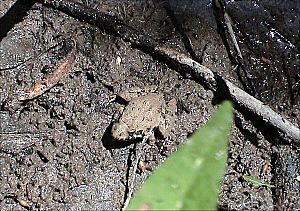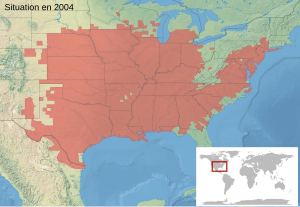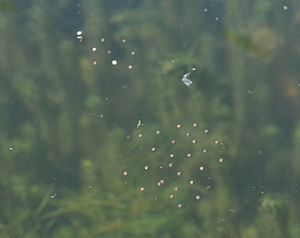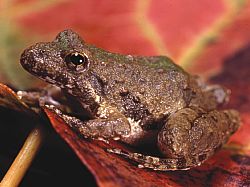Northern cricket frog facts for kids
Quick facts for kids Northern Cricket Frog |
|
|---|---|
 |
|
| Northern Cricket Frog, Acris crepitans | |
| Conservation status | |
| Scientific classification | |
| Kingdom: | |
| Phylum: | |
| Class: | |
| Order: | |
| Family: | |
| Genus: | |
| Species: |
A. crepitans
|
| Binomial name | |
| Acris crepitans Baird, 1854
|
|
| Subspecies | |
|
Acris crepitans blanchardi |
|
 |
|
The Northern Cricket Frog (Acris crepitans) is a species of small Hylid frogs. They are native to the United States and northeastern Mexico. Northern cricket frogs are small frogs, between 0.75 and 1.5 inches (19–38 mm) long. They eat crickets and small insects. They usually reproduce in April through May. Tadpoles hatch within a few days.
Description
The northern cricket frog is one of North America's two smallest vertebrates, ranging from 19–38 mm (0.75–1.50 in) long.
Its dorsal coloration varies widely, and includes greys, greens, and browns, often in irregular blotching patterns.
The southern cricket frog has longer legs, with less webbing on the hind feet, and a more pointed snout; northern cricket frogs have been observed with snouts indistinguishable from those of the southern species.
The line on the back of its thigh is typically more sharply defined than that of the northern cricket frog. Biologists have recorded northern cricket frogs in the northern fringes of their range with extremely sharp posterior leg stripes.
Behavior and diet
Northern cricket frogs are diurnal and generally active much of the year, except in midwinter in northern areas when the water is frozen. Their primary diet is small (13 to 38 mm (0.5 to 1.5 in) long) insects, including mosquitos. They are, in turn, preyed upon by a number of species, including birds, fish, and other frogs. To escape predators, they are capable of leaping up to 3 feet in a single jump and are excellent swimmers.
Reproduction
Breeding generally occurs from May through July. The males call from emergent vegetation with a high-pitched, short, pebble-like call which is repeated at an increasing rate. The sound suggests pebbles being clicked together, much like a cricket, hence the name. One egg is laid at a time, generally attached to a piece of vegetation. The 14 millimetres (0.55 in) tadpoles hatch in only a few days, and undergo metamorphosis in early fall. Maturity is usually reached in less than a year.
Habitat
Cricket frogs prefer the edges of slow-moving, permanent bodies of water. Large groups of them can often be found together along the muddy banks of shallow streams, especially during premigratory clustering. The northern cricket frog has been observed to hibernate upland, often at considerable distances from water.
Images for kids
See also
 In Spanish: Acris crepitans para niños
In Spanish: Acris crepitans para niños





